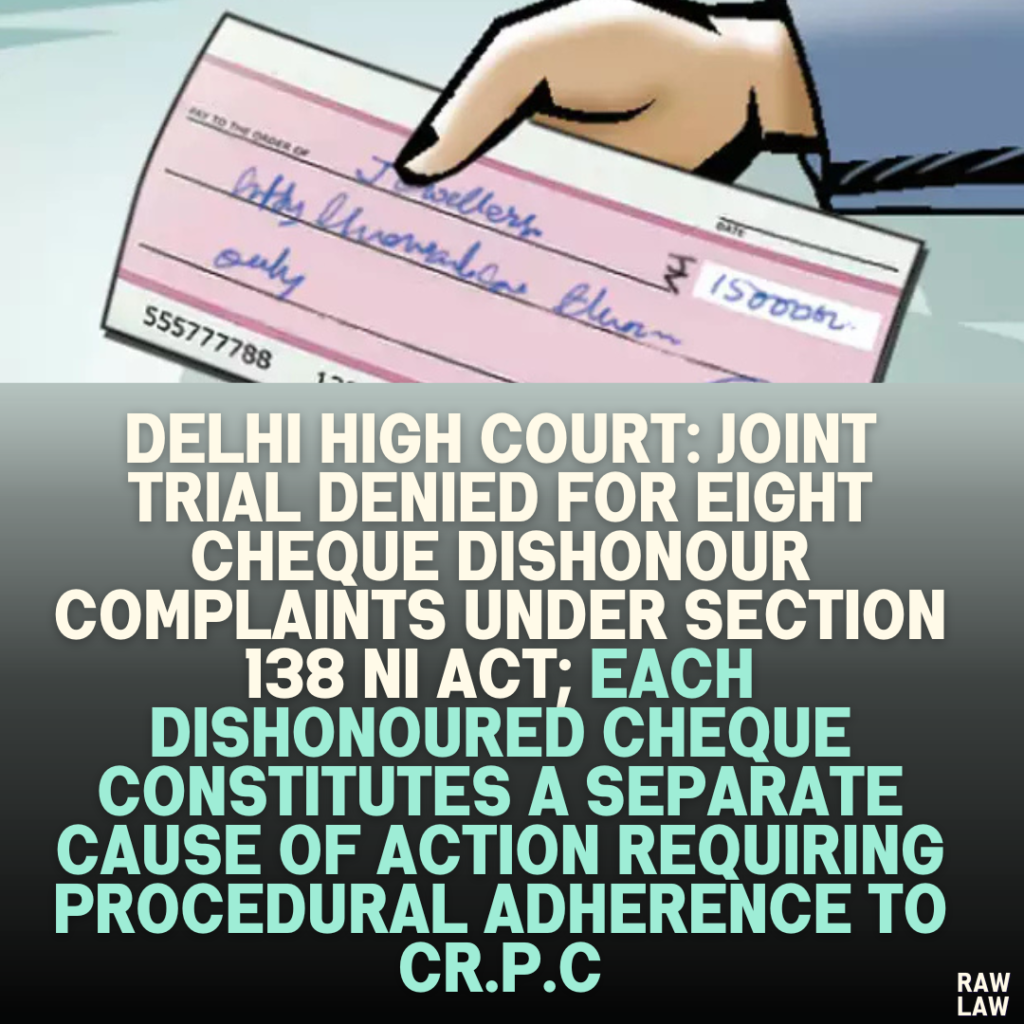1. Court’s Decision:
The Delhi High Court rejected the petitioner’s request to consolidate eight complaints filed under Section 138 of the Negotiable Instruments Act (NI Act), 1881, for dishonoured cheques, into a single trial. The court held that:
- Each dishonoured cheque constitutes a separate offence and cause of action.
- The request for a joint trial of all eight complaints exceeded the procedural limitations set by Section 219 of the Criminal Procedure Code (Cr.P.C.), which allows a maximum of three offences of the same kind to be tried together.
- The court, however, directed the trial court to consolidate up to three cases of the same kind to streamline the process, as per Section 219 Cr.P.C.
2. Facts:
- The petitioner had a business relationship with the complainant and issued eight cheques, amounting to ₹78,58,007.23, to settle outstanding dues for goods supplied.
- All cheques were dishonoured upon presentation, leading the complainant to file separate complaints under Section 138 of the NI Act for each dishonoured cheque.
- The petitioner sought to combine all eight complaints into one trial, arguing that they arose from the same transaction and involved the same parties, evidence, and witnesses.
3. Issues:
- Can multiple complaints under Section 138 of the NI Act, arising from dishonoured cheques issued in the course of a single business transaction, be consolidated into a single trial?
- Do Sections 219 and 220 of the Cr.P.C. permit such consolidation?
4. Petitioner’s Arguments:
- Consolidation for Efficiency: The petitioner argued that the complaints arose from a single transaction and shared the same factual background. Therefore, consolidating them would save judicial time and resources.
- Avoiding Multiplicity: Separate trials would lead to duplication of proceedings, witnesses, and evidence, which is unnecessary and prejudicial to the petitioner.
- Precedents Cited:
- Unique Infoways Pvt. Ltd. v. MPS Telecom Private Limited: Joint trials should be allowed when multiple complaints arise from the same transaction.
- Sharma Contracts (India) Pvt. Ltd. v. State & Anr.: Consolidation of complaints in cheque dishonour cases reduces duplication.
- Ashutosh Humnabadkar v. Continental Device India Ltd.: Joint trials in similar cases ensure judicial economy.
5. Respondent’s Arguments:
- Separate Causes of Action: The respondents emphasized that the dishonour of each cheque constitutes a distinct offence under Section 138 of the NI Act, requiring separate complaints.
- Legal Provisions: Sections 219 and 220 of the Cr.P.C. do not permit consolidating more than three cases unless the offences form part of the same transaction.
- Prejudice to Complainant: Consolidation could lead to procedural disadvantages, as a single trial might result in one conviction instead of separate convictions for each dishonoured cheque.
- Precedents Cited:
- Lalu Prasad Yadav v. State through CBI (2003): Offences arising from distinct actions cannot be clubbed if they do not form the same transaction.
- Rajendra B. Choudhari v. State of Maharashtra (2007): Consolidation is not appropriate when offences are unrelated in cause and nature.
6. Analysis of the Law:
- Section 219 Cr.P.C.: Allows consolidation of up to three offences of the same kind within 12 months.
- Section 220 Cr.P.C.: Permits joint trials only if offences form part of the same transaction or series of acts.
- Application to the NI Act: The dishonour of each cheque is treated as a separate offence, and the issuance of distinct demand notices reinforces this separateness.
The court referred to:
- Re: Expeditious Trial of Cases under Section 138 NI Act (2021): This Supreme Court case emphasized that consolidation beyond three offences under Section 219 requires legislative amendments.
- Vani Agro Enterprises v. State of Gujarat: Reiterated that consolidation of more than three cases contravenes Section 219 Cr.P.C., even in cheque dishonour cases.
7. Precedent Analysis:
- The court distinguished between cases allowing consolidation and the procedural limitations under the Cr.P.C. It relied on Supreme Court rulings emphasizing that while judicial efficiency is crucial, procedural safeguards must be respected.
- The Re: Expeditious Trial case underscored the need for legislative amendments to address consolidation in cheque dishonour cases.
8. Court’s Reasoning:
- Distinct Offences: Each dishonoured cheque constitutes a separate offence under the NI Act, supported by independent demand notices and complaints.
- Procedural Limitation: Section 219 Cr.P.C. restricts joint trials to three offences, and there is no legal basis to exceed this limit without legislative amendment.
- Judicial Efficiency: While consolidation could streamline the trial process, it cannot override procedural safeguards.
9. Conclusion:
The court upheld the trial court’s decision and rejected the petitioner’s plea for a single trial. It directed the trial court to consolidate up to three complaints in accordance with Section 219 Cr.P.C., balancing procedural compliance with judicial efficiency.
10. Implications:
This judgment:
- Reinforces the procedural distinctiveness of offences under the NI Act.
- Highlights the limitations of Sections 219 and 220 Cr.P.C. in cheque dishonour cases.
- Calls attention to the need for legislative reform to address practical issues in handling multiple cheque dishonour complaints.
The judgment clarifies that while judicial economy is important, it cannot come at the expense of procedural correctness. This ruling impacts how cheque dishonour cases involving multiple cheques are handled, encouraging clarity and efficiency in legal proceedings.
